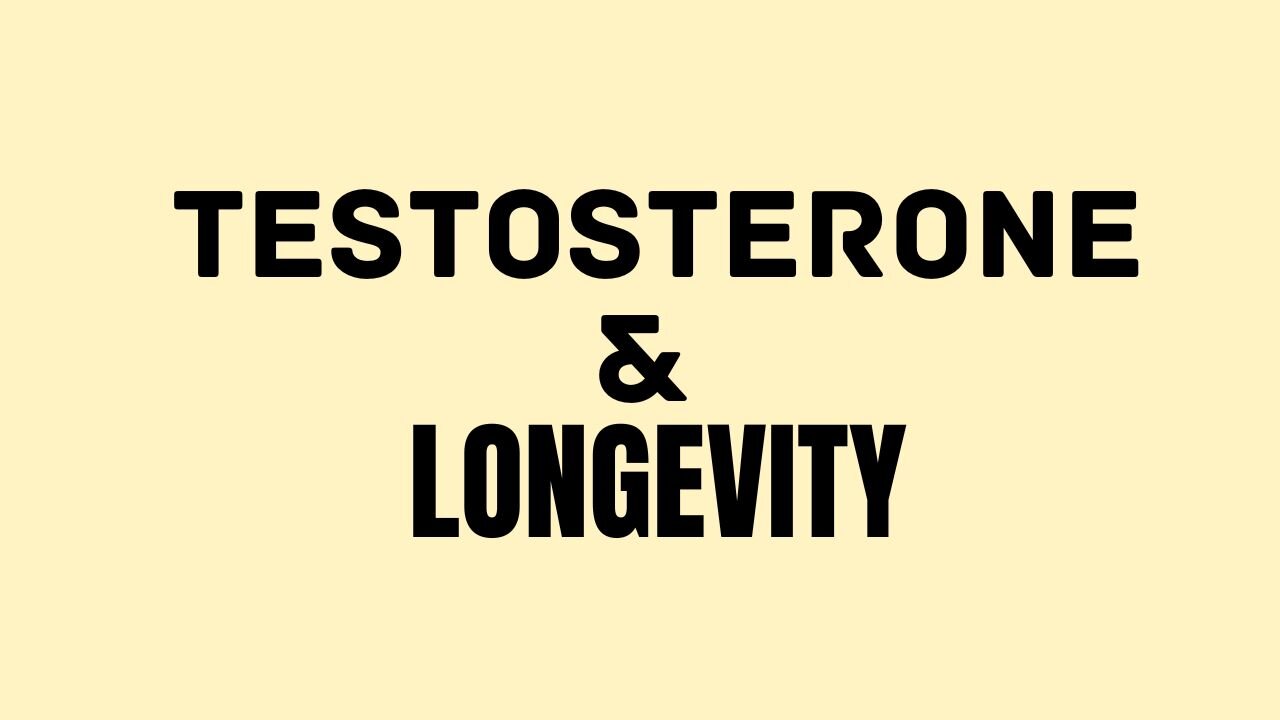Premium Only Content

Why Your Testosterone Levels Are Secretly Destroying Your Longevity
The Intricate Link Between Testosterone and Longevity
Testosterone, the primary male sex hormone, is essential for numerous bodily functions beyond its well-known role in sexual health. It influences muscle mass, bone density, mood, and cognitive function, making it a critical hormone throughout a man’s life. However, as men age, testosterone levels naturally decline, leading to various health challenges. This decline has sparked interest in understanding the relationship between testosterone levels and longevity. Does maintaining or enhancing testosterone levels through therapy extend life, or does it pose risks that could shorten lifespan?
Understanding Testosterone's Role
Testosterone is produced mainly in the testes and in smaller amounts in the adrenal glands. It regulates several vital processes:
1. Muscle and Bone Health: Testosterone supports the growth and maintenance of muscle and bone tissue, crucial for physical strength and mobility.
2. Sexual Function: It drives libido and supports sperm production, playing a central role in male reproductive health.
3. Cognitive and Emotional Well-being: Testosterone influences mood and cognitive function, with low levels often associated with depression, fatigue, and cognitive decline.
The Potential Longevity Benefits of Testosterone
Research suggests that maintaining optimal testosterone levels may positively impact longevity:
1. Cardiovascular Health: Testosterone contributes to heart health by promoting healthy blood circulation and reducing the risk of atherosclerosis. Some studies have found that men with normal testosterone levels are less likely to suffer from cardiovascular diseases, which are among the leading causes of death worldwide.
2. Muscle Mass and Physical Function: As men age, they naturally lose muscle mass, a condition known as sarcopenia. This loss of muscle increases the risk of frailty, falls, and fractures, all of which can significantly reduce life expectancy. Testosterone therapy has been shown to help preserve muscle mass and strength, which may contribute to a longer, healthier life.
3. Cognitive Preservation: Testosterone may have protective effects on the brain, helping to maintain cognitive function as men age. This cognitive preservation could enhance the quality of life in later years, indirectly contributing to increased longevity.
The Risks of High Testosterone Levels
While maintaining healthy testosterone levels can be beneficial, excessively high levels or inappropriate testosterone therapy can be harmful:
1. Increased Cardiovascular Risk: Some studies suggest that very high testosterone levels may increase the risk of cardiovascular events, such as heart attacks and strokes. This risk is particularly pronounced in men who misuse testosterone supplements, taking doses higher than medically recommended.
2. Prostate Cancer Risk: Elevated testosterone levels have been implicated in an increased risk of prostate cancer, although this link remains a subject of debate. Given that prostate cancer is a leading cause of cancer-related death in men, the potential risk cannot be ignored.
3. Behavioral and Psychological Effects: High testosterone levels have been linked to increased aggression and risky behaviors, which could negatively impact health and safety, potentially reducing lifespan.
The Natural Decline of Testosterone with Age
Starting around the age of 30, men typically experience a gradual decline in testosterone levels, leading to symptoms such as reduced libido, decreased energy, and loss of muscle mass. This decline is a natural part of aging, but it raises the question: should men counteract this decline with testosterone replacement therapy (TRT)?
Testosterone Replacement Therapy (TRT) and Its Impact on Longevity
TRT is often prescribed to men with low testosterone levels, with the aim of alleviating symptoms and improving quality of life. However, the effects of TRT on longevity are complex and vary depending on several factors:
1. Individual Health Status: The benefits and risks of TRT can differ significantly based on an individual's overall health, age, and pre-existing conditions.
2. Proper Dosage and Monitoring: When administered correctly and monitored by healthcare professionals, TRT can offer health benefits without significantly increasing risks. However, misuse of testosterone therapy, particularly at doses higher than what is medically advised, can lead to adverse outcomes.
3. Quality of Life Improvements: For many men, TRT can significantly improve quality of life by restoring energy levels, mood, and sexual function. This improved quality of life could indirectly contribute to a longer life, especially if it encourages healthier lifestyle choices.
-
 2:55:11
2:55:11
Barry Cunningham
5 hours agoPRESIDENT TRUMP MADE TODAY A VERY BAD DAY TO BE A DEMOCRAT!
66.5K40 -
 1:15:29
1:15:29
Flyover Conservatives
22 hours agoFrom Cool to Cringe: How Democrats Lost America’s Ear | FOC Show
23.5K3 -
 8:19
8:19
MattMorseTV
8 hours ago $0.26 earnedTrump is ACTUALLY DOING IT.
21.5K31 -

ZWOGs
11 hours ago🔴LIVE IN 1440p! - Tarkov w/ Casey & crgoodw1n, Kingdom Come Deliverance, & More - Come Hang Out!
18K4 -
 LIVE
LIVE
We Like Shooting
15 hours ago $0.03 earnedWe Like Shooting 625 (Gun Podcast)
162 watching -
 1:45:02
1:45:02
Glenn Greenwald
6 hours agoIsrael Slaughters More Journalists, Hiding War Crimes; Trump's Unconstitutional Flag Burning Ban; Glenn Takes Your Questions | SYSTEM UPDATE #504
113K121 -
 1:29:31
1:29:31
Killerperk
3 hours ago $0.36 earnedRoad to BF6. Come hang out #regiment #bf6
19.8K1 -
 LIVE
LIVE
Jokeuhl Gaming and Chat
4 hours agoDARKTIDE - Warhammer 40k w/ Nubes Bloobs and AoA
56 watching -
 LIVE
LIVE
Cripiechuccles
5 hours ago😁💚💙MOTA MONDAY WITH CRIPIE💚💙 👌SMOKING, GAMING & WATCHING FLICKS!:😁
43 watching -
 36:11
36:11
Stephen Gardner
3 hours ago🔥'Burn ALL TRUMP FLAGS’ says Tim Walz + Democrat CAUGHT rigging own election!
20.1K12